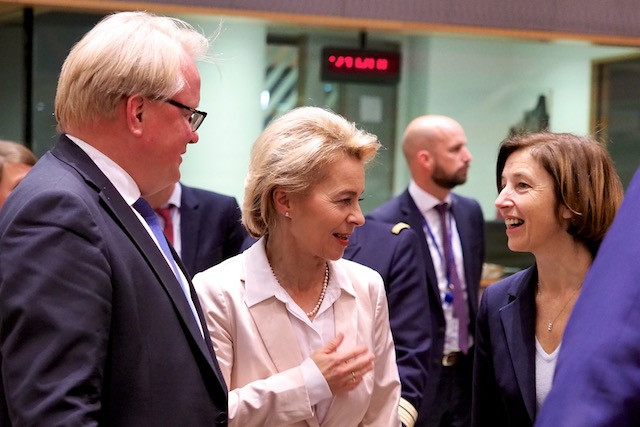Other projects signed off include a European armoured vehicle, cyber response teams and a high-atmosphere airship for intelligence gathering and reconnaissance.
Seventeen security projects were approved by the EU’s foreign and defence ministers on Monday, adding to 17 agreed last December, as part of efforts to deepen military cooperation on air, land and sea.
The latest push comes after the leaders of France and Germany said in separate speeches that Europe needs to shoulder more responsibility for its defence. In an impassioned speech to the Bundestag on Sunday, French president Emmanuel Macron warned that Europe risked becoming the toy of other powers without a common defence policy.
EU defence policy faltered for decades, but the mood changed after Russia’s 2014 annexation of Crimea, while the Brexit vote and Donald Trump’s election in 2016 added momentum to long-stalled initiatives.
The shift in outlook helped revive the Brussels idea of ”permanent structured cooperation”, known as Pesco. The Joint EU Intelligence school announced on Monday, “will provide education and training in intelligence disciplines and other specific fields to EU member states intelligence personnel”. It is led by Greece with the participation of Cyprus.
Hardware projects include a German-led plan for a Eurodrone involving five countries or an upgrade to the European attack helicopter, the Tiger Mk 3, which is led by France, with participation of Germany and Spain.
Only the UK, Denmark and Malta are not taking part in any projects. The UK, long hostile to EU defence initiatives, has become more interested in being involved, say EU sources. The EU is due to announce by the end of the year the terms for non-EU countries to take part in Pesco projects.
France has been pressing the EU to adopt a strict division between EU and non-EU countries, fearing its companies could lose out on lucrative contracts.
Sven Biscop, a defence expert at the Egmont Royal Institute of International Relations in Brussels, argues that the EU should be flexible about the UK, because the departing state is “a major potential customer of any major platform” and has expertise, such as aerospace.
“On the one hand the point of Pesco is to overcome defence industrial protectionism and at the same time you are raising a new barrier vis-a-vis the UK, which I think is very unhelpful.”
The success of Pesco, Biscop said, would be measured in action to fill gaps in Europe’s strategic capabilities, rather than an annual announcement of 15-20 projects.
Europe is spending more money on defence, but for individual countries “that money is not enough to buy big-ticket items” he said, arguing that Pesco could be the place where states meet Nato commitments to spend 2% of GDP on defence.
“If France and Germany really do what they have announced and merge their efforts in all these areas, and award just one contract for just one new fighter aircraft and so on, then I think the other continental European countries will have to join, because that will be the only game in town in terms of defence,” he said.
“France and Germany also need [other member states] to join because they will require more customers than just those two countries.”
The EU rejects the charge – aired most recently by US president, Donald Trump – that its defence ambitions conflict with Nato. Nato secretary-general Jens Stoltenberg will meet EU defence ministers on Tuesday.
On Monday the EU said it was carrying out with Nato “a major civil-military crisis management exercise” to test how Europe responded to a hybrid attack from a fictitious country that targeted energy, health and communications systems.
An EU official said it was an “imaginary scenario” that looked at “a country that is not very far away from the European Union [and] is having stability problems”.
Jennifer Rankin in Brussels
